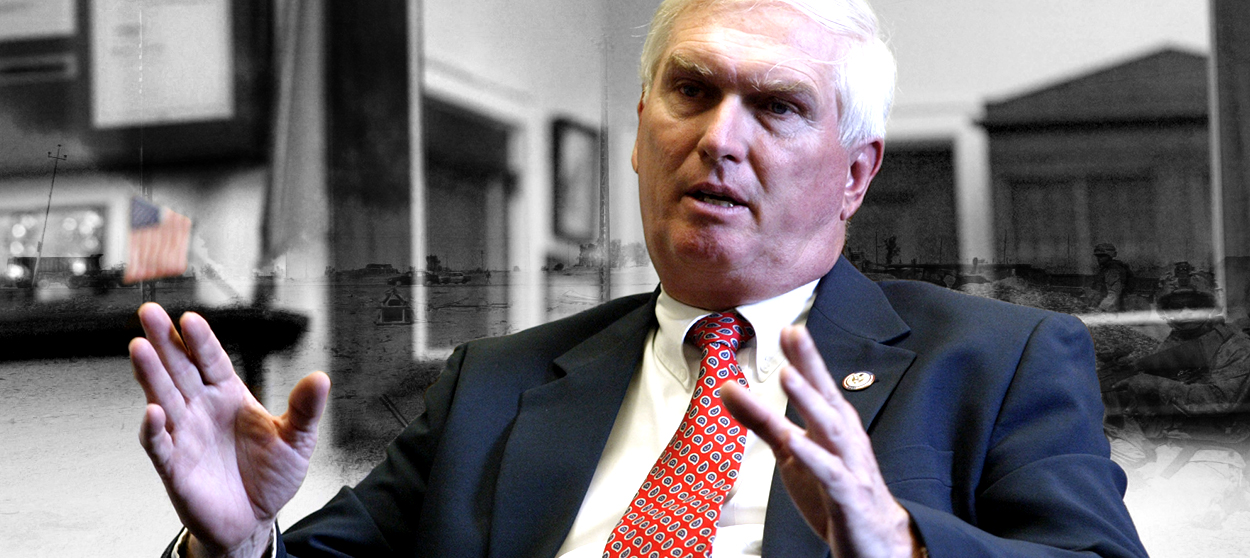Jimmy Duncan, the hero America ignored
Behold: The last Republican who opposed the Iraq War


A free daily email with the biggest news stories of the day – and the best features from TheWeek.com
You are now subscribed
Your newsletter sign-up was successful
Many political junkies are convinced that President Trump's grip on the GOP is so tight, his takeover of the party so complete, that he can banish any conservative lawmaker who dares oppose him. There is some truth to this — just look at Mark Sanford and Jeff Flake.
But this dynamic was even more true in the early years of George W. Bush's presidency, when any Republican who dared criticize the war effort was unceremoniously kicked to the curb.
Anti-war Republicans of this era were maligned, primaried, and pushed to the furthest outskirts of conservative media for criticizing the Iraq War. Bush's former speechwriter David Frum wrote in National Review that dissidents to the Iraq War like Pat Buchanan, Robert Novak, and Justin Raimondo were "unpatriotic conservatives." Neoconservatism and the belief that America could export Jeffersonian democracy became orthodoxy in the GOP. Only six Republicans in the House and one in the Senate cast themselves as heretics and voted against the Iraq War resolution, of whom only one remains in Congress.
The Week
Escape your echo chamber. Get the facts behind the news, plus analysis from multiple perspectives.

Sign up for The Week's Free Newsletters
From our morning news briefing to a weekly Good News Newsletter, get the best of The Week delivered directly to your inbox.
From our morning news briefing to a weekly Good News Newsletter, get the best of The Week delivered directly to your inbox.
That man is Rep. Jimmy Duncan (Tenn.). He is the last serving Republican to vote against the Iraq War. He's retiring now after 30 years in Congress. And although he never received much media attention, Duncan deserves praise as a stalwart against the Bush administration's policy of nation-building at a time when it was considered political suicide.
Unlike the liberal-leaning Republicans who criticized the Iraq War, Duncan was from a conservative district in the South, and both the Bush administration and his own family pressured him to vote for the war. During a meeting before the vote, Bush aides including National Security Adviser Condoleezza Rice, CIA Director George Tenet, and Tenet's deputy director John McLaughlin held an hour-long meeting with Duncan to convince him to vote for the war. After hearing their pitch, Duncan asked, "Do you have any evidence of any imminent threat?" They did not.
In an interview with the Knoxville News Sentinel, Duncan said he was persona non grata after the vote. Lobbyists conspired to prevent him from ever chairing a committee. Even his local pastor asked him not to deliver a lay sermon at church because he feared people would walk out of the service.
But history has vindicated Duncan. He was right to oppose the Iraq War. Sadly, it took over $1 trillion and 100,000 deaths before American public opinion caught up with Duncan's instincts.
A free daily email with the biggest news stories of the day – and the best features from TheWeek.com
"I am not a pacifist by any stretch of the imagination," Duncan said to the Knoxville News Sentinel. "But I think you should never go to war unless there's no other reasonable alternative and then only as a very last resort."
The Tennessee congressman was so resolute in his decision that four years later, he was just one of four Republicans to vote for withdrawing troops from Iraq by April 2008. In 2010, he was again one of only four Republicans to vote for removing troops from Afghanistan.
Duncan belongs to a brand of conservatism that dates back to the Eisenhower era, one that regularly opposed both the military industrial complex and big business. He looked out for the interests of Main Street instead of Wall Street and voted to protect America's liberty and security at home instead of traveling the world in search of monsters to destroy. He voted against the Wall Street bailouts and the stimulus package after the financial crisis. He regularly voted against the bloated military budget while continuing to advocate for greater border security and counter-terrorism funding domestically.
Other Republicans used to believe in the same things Duncan advocates. Preserving American greatness isn't achieved by sending a generation to fight and die to "make the world safe for democracy." It ought to be about advocating for the working class instead of Wall Street, K Street, or weapons developers who live in and around Washington, D.C.
Conservatives spent years idolizing Bush's foreign policy for "keeping us safe," and then Paul Ryan's promise for a "Path to Prosperity" and balanced budgets. Instead, they should have been paying attention to Jimmy Duncan. Quietly, and all this time, they had in front of them a man who showed bravery, conviction, and dedication to the idea of limited government at home and abroad.
Ryan Girdusky is a writer based out of New York.
-
 Are Hollywood ‘showmances’ losing their shine?
Are Hollywood ‘showmances’ losing their shine?In The Spotlight Teasing real-life romance between movie leads is an old Tinseltown publicity trick but modern audiences may have had enough
-
 A dreamy long weekend on the Amalfi Coast
A dreamy long weekend on the Amalfi CoastThe Week Recommends History, pasta, scenic views – this sun-drenched stretch of Italy’s southern coast has it all
-
 Can foster care overhaul stop ‘exodus’ of carers?
Can foster care overhaul stop ‘exodus’ of carers?Today’s Big Question Government announces plans to modernise ‘broken’ system and recruit more carers, but fostering remains unevenly paid and highly stressful
-
 The billionaires’ wealth tax: a catastrophe for California?
The billionaires’ wealth tax: a catastrophe for California?Talking Point Peter Thiel and Larry Page preparing to change state residency
-
 Bari Weiss’ ‘60 Minutes’ scandal is about more than one report
Bari Weiss’ ‘60 Minutes’ scandal is about more than one reportIN THE SPOTLIGHT By blocking an approved segment on a controversial prison holding US deportees in El Salvador, the editor-in-chief of CBS News has become the main story
-
 Has Zohran Mamdani shown the Democrats how to win again?
Has Zohran Mamdani shown the Democrats how to win again?Today’s Big Question New York City mayoral election touted as victory for left-wing populists but moderate centrist wins elsewhere present more complex path for Democratic Party
-
 Millions turn out for anti-Trump ‘No Kings’ rallies
Millions turn out for anti-Trump ‘No Kings’ ralliesSpeed Read An estimated 7 million people participated, 2 million more than at the first ‘No Kings’ protest in June
-
 Ghislaine Maxwell: angling for a Trump pardon
Ghislaine Maxwell: angling for a Trump pardonTalking Point Convicted sex trafficker's testimony could shed new light on president's links to Jeffrey Epstein
-
 The last words and final moments of 40 presidents
The last words and final moments of 40 presidentsThe Explainer Some are eloquent quotes worthy of the holders of the highest office in the nation, and others... aren't
-
 The JFK files: the truth at last?
The JFK files: the truth at last?In The Spotlight More than 64,000 previously classified documents relating the 1963 assassination of John F. Kennedy have been released by the Trump administration
-
 'Seriously, not literally': how should the world take Donald Trump?
'Seriously, not literally': how should the world take Donald Trump?Today's big question White House rhetoric and reality look likely to become increasingly blurred
